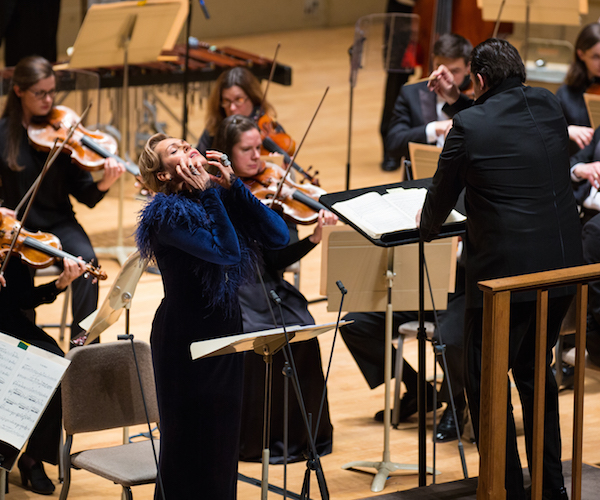Concert Review: Boston Symphony plays Mozart and Shostakovich
Despite the difficult subject matter and Shostakovich’s often-dissonant approach to it, the Fourteenth has always been a highly-regarded – if infrequently-played – work.

Kristine Opolais with Andris Nelsons and the Boston Symphony. Photo: Robert Torres.
By Jonathan Blumhofer
It may not be a shoo-in, but, were there an award for bleakest symphony, Dmitri Shostakovich’s Fourteenth would at least be a finalist. A setting of eleven poems by Federico Garcia Lorca, Guillaume Apollinaire, W. K. Küchelbecker, and Rainer Maria Rilke for soprano and bass soloists plus an orchestra of strings and percussion, the Fourteenth’s overriding message is that death is all-powerful and ever-present. And when the arrival of oblivion is untimely, death is at its worst.
The Symphony’s nihilism has been off-putting for some: Alexander Solzhenitsyn, for one, found its message too grim. But, despite the difficult subject matter and Shostakovich’s often-dissonant approach to it, the Fourteenth has always been a highly-regarded – if infrequently-played – work.
The Boston Symphony Orchestra’s (BSO) history with it is a case-in-point: this weekend’s performances mark just the second time orchestra’s programmed it ever – the last was in 1990.
From an interpretive standpoint, the reading of the piece Andris Nelsons drew from the BSO on Thursday night was, in its own way, about as impressive as his virtuoso effort in the Shostakovich Eleventh Symphony earlier this season.
Everything was smartly paced. None of the score’s few recurring motives were over-emphasized; rather, Nelsons allowed them to emerge subtly but clearly. The music’s phantasmagoric colors – from ethereal celesta to the deathly dry xylophone attacks to the surreal passages for simultaneous pizzicato and col legno strings – proved as arresting, psychologically, as they did gesturally. Thursday’s was clearly a reading by a musician with a strong conception of what the music is about.
Overall, though, one sensed that the BSO needs a bit more time to grow into the piece. While it ended strongly, parts of the first half (notably the “Malagueña” and “Loreley”) were, in full ensemble passages, tonally and rhythmically soft-edged. And impassioned moments, like the treacherously high cello writing in “O Delvig,” sometimes veered towards tentativeness.
That said, the Symphony’s delicate sections, like the wispy violin writing in the “De Profundis,” came across with immediacy. And, throughout the night, the low strings’ rhythms were impressively tight and their articulations of the score’s busy, low textures (from crunching density to keening glissandos) precise.
Each of the evening’s soloists, too, had their moments.
Soprano Kristine Opolais isn’t exactly the type of singer you’d expect to hear in this piece. Her voice is, generally, lighter and brighter than the music often seems to call for. And, on Thursday, she had some difficulty cutting through the full ensemble.
Still, Opolais brought a fervent intensity to several of her solos, particularly the latter half of the tragic “Loreley,” the whole of the despairing “The Suicide” (which was superb), and “On the Alert.”
On the other side of the podium, bass Alexander Tsymbalyuk was close to ideal. He’s got a big voice and sings with a robust, bronze tone. His vibrato is minimal, diction excellent, and sound pure. From the recitative-like utterances of the “De Profundis” to the wickedly snide “The Zaporozhye Cossacks’ Reply to the Sultan of Constantinople” and the rending pathos of “O Delvig, Delvig!,” Tsymbalyuk delivered a performance of searing passion and warm humanity.
Preceding the Shostakovich came Mozart’s woodwind Serenade no. 10 in B-flat. Emotionally, expressively, stylistically – this so-called Gran Partita was the Symphony’s polar opposite.
From a technical standpoint, the BSO’s wind ensemble on Thursday night was generally solid, though its playing was periodically marred by lapses in intonation (including a ghastly out-of-tune oboe solo in the second Minuet).
Interpretively, the night’s reading was neither here nor there. Some moments were superb. The famous Adagio sang gloriously. The second trio of that second Minuet cut loose with rustic brio. The sixth-movement theme and variations, by and large, brimmed with character.
But other spots – much of the body of the first movement; both Minuets, proper; parts of the Romance – felt earthbound.
A conductor might have helped matters: Nelsons had been slated to lead the Mozart, but a cold caused him to withdraw and only direct the Shostakovich. The Mozart proceeded sans chef. Perhaps, then, the Serenade’s unevenness was but an unwitting anticipation of the Shostakovich’s observation about death (or, in this case, misfortune) intruding on our “moments of goodness”?
Jonathan Blumhofer is a composer and violist who has been active in the greater Boston area since 2004. His music has received numerous awards and been performed by various ensembles, including the American Composers Orchestra, Kiev Philharmonic, Camerata Chicago, Xanthos Ensemble, and Juventas New Music Group. Since receiving his doctorate from Boston University in 2010, Jon has taught at Clark University, Worcester Polytechnic Institute, and online for the University of Phoenix, in addition to writing music criticism for the Worcester Telegram & Gazette.
Tagged: Andris Nelsons, Boston Symphony Orchestra, Dmitri Shostakovich
